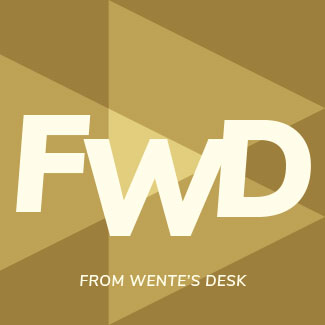Reflecting on how we communicate

Last week, I hosted our newest cohort of Wake Forest Fellows for lunch. This group of bright, talented recent graduates have taken up fellowship roles in offices across our campuses. We were together to have a conversation about career pathways and leadership, but admittedly, it was set against the backdrop of current events.
One Fellow asked me, “The world is changing so fast. What does it feel like to be President right now?” I answered that being a university president, both in the past and today, is both a privilege and a challenge. And we indeed find ourselves in a challenging time, not just to be a university president but a student, a staff member, a faculty member, an administrator – an empathetic citizen of a world in which conflict and divisiveness can feel like the norm.
But is this the most challenging time to be a university president? I asked our Fellows who studied history to think about that question. They shook their heads, “no.” We called forth other difficult times, like leading on campuses during protests against the Vietnam War and leading university communities during the Civil Rights Movement. As Mark Twain famously said, “History doesn’t repeat itself, but often it rhymes.”
Thinking about the complexity we are navigating today, I view how we communicate as especially critical to get right. What we communicate, how we communicate, when and how often we communicate, and in what circumstances we communicate all matter greatly to campus communities — and communication is a bedrock principle of my leadership style. Communication builds trust, it reinforces accountability, and it dispels rumors and disinformation.
As we enter a new academic year, I have reflected a great deal about how I have communicated with the campus during my presidency. When I arrived, I established new approaches to communication — including the creation of InsideWFU and WFU Should Know; weekly newsletters to share what is going on in real time (and to reduce clutter in our collective email boxes with individual messages!). I started this blog, where I try to capture my perspectives on current issues and events. And, as Wake Forest presidents before me have done, I committed to speaking in public campus forums; for example, at the Presidential Address, a time both to share important strategic updates for the University in person and provide space for the community to gather afterward for conversation.
However, communication is more than words – it is actions. I communicate my commitment to you and to Wake Forest by being present; by visiting department meetings and shared governance groups; by hosting faculty and staff for lunches and chatting with students around campus; and by prioritizing time each day to meet with and talk to faculty, students, staff, alumni and community members — both formally and informally.
Communication also means speaking on behalf of the University, as authorized by the Board of Trustees, sometimes in moments of difficulty. When those moments occur, you can expect that I will provide as much information as I can, as quickly as I can – either directly or through our University Marketing and Communications team.
During the 2021-22 academic year, I established an Institutional Messages Committee, a group of University leaders who are charged with recommending ways to respond to community needs. In creating this group, I emphasized that I did not want just to draft messages to consider – but also actions that demonstrate community care. I believe when something significant happens in our world, the most important first step is to provide support and comfort to those impacted and a chance to be in community with one another, sharing empathy and connection. We strive to create those opportunities whenever we can and continually improve our communications’ clarity, conciseness and accuracy, as called for in the recent After Action Review Committee Report.
Going forward, it is also important to clarify that it is University practice only to consider issuing statements in response to issues or events directly connected to our core function and mission. Put simply, it is not my role as president to tell our community what to think — or specifically, what I think – about what is happening in the world or to establish a single university point of view on other issues or events. At their best, academic communities are places where ideas and perspectives can be exchanged freely. Universities like Wake Forest are uniquely positioned in moments of challenge to create space for different and even divergent points of view, to educate about issues, to debate with one another, and to process and make sense of current events. I believe this is what great universities are called to do and what Wake Forest is uniquely positioned to do well in our society. Indeed, our Strategic Framework, released in August 2023, named the ways our motto invites us to engage in dialogue across differences.
As we enter this new semester – with a presidential election on the horizon and the complexities and challenges of our world ever present – I hope you will reflect as I have on ways we can continue to make things better. Our communications and our actions as members of this community truly matter. And how we choose to engage with one another and how we treat one another form the foundation for our shared experience in this community and beyond.
Categories: From Wente's Desk
